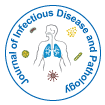当社グループは 3,000 以上の世界的なカンファレンスシリーズ 米国、ヨーロッパ、世界中で毎年イベントが開催されます。 1,000 のより科学的な学会からの支援を受けたアジア および 700 以上の オープン アクセスを発行ジャーナルには 50,000 人以上の著名人が掲載されており、科学者が編集委員として名高い
。オープンアクセスジャーナルはより多くの読者と引用を獲得
700 ジャーナル と 15,000,000 人の読者 各ジャーナルは 25,000 人以上の読者を獲得
インデックス付き
- Google スカラー
- レフシーク
- ハムダード大学
- エブスコ アリゾナ州
- ICMJE
役立つリンク
オープンアクセスジャーナル
このページをシェアする
抽象的な
Assessment of Knowledge, Attitude and Practice on Louse Infestation and Associated Factors, among Prisoners of Jimma Town Prison South Western Ethiopia
Xtiana Daniel
Background: Louse infestation is the poor personal hygiene and a blood feeding ectoparasitic insect of order ptrithirapetera. Inadequate access of water supply leads people to acquire communicable disease such as typhus and relapsing fever. Head lice cause much distress and worry in families with school-aged children. There are many available treatment options. Many of these options are costly and may not be effective.
Objective: To assess the knowledge, attitude and practice of louse infestation versus disease transmission among prisoners of Jimma town prison at Jimma town from Jan, 2021 GC.
Methodology: Cross-sectional study was conducted in Jimma prison at Jimma town from Jan, 2021 GC. The data was collected using pretested questionnaires interview with translating the questionnaires to local language and observation. Three hundred twenty eight prisoners were enrolled through simple random sampling techniques.
Results: All prepared questions were asked to measure the knowledge, attitude and practice of respondents about louse infestation and related disease. Accordingly; 243 (74.1%) were found to have good knowledge and 15(4.6%) had poor knowledge. By attitude, it was found that, 223(68%) had positive attitude while 105(32%) had negative attitude from those who are asked to response. On the other hand, 236(72%) of respondents were have good practices and 92(28%) were had poor practices.
Conclusion: The level of louse infection prevention practice in our study area was low. Therefore, responsible stakeholders including Zonal health departments, Woreda health offices and extension workers should work on enabling factors specially focusing on prison hygiene and related factors.

 English
English  Spanish
Spanish  Chinese
Chinese  Russian
Russian  German
German  French
French  Portuguese
Portuguese  Hindi
Hindi